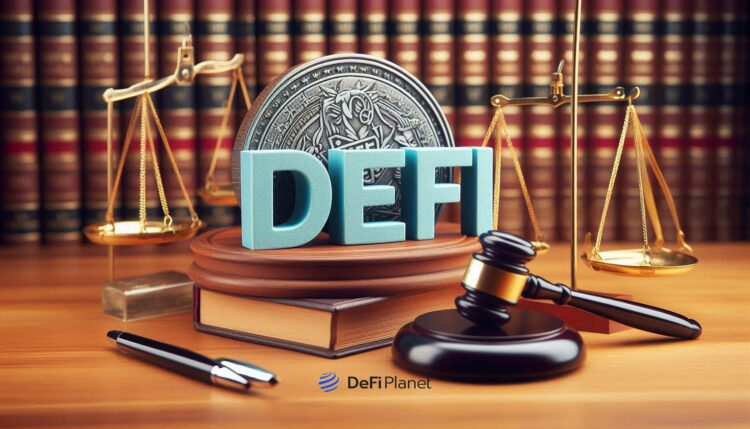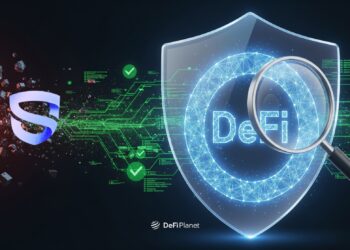As blockchain technology has taken the world by storm over the past few years, Decentralized Finance (DeFi) has emerged as one of its most transformative innovations with significant implications for the financial sector.
DeFi promises greater accessibility through trustless platforms (i.e. requiring no counterparty such as a bank), transparency, and efficiency compared to traditional financial (TradFi) systems.
However, its rapid growth and decentralized nature have raised significant regulatory challenges. The question of whether DeFi should be regulated is complex, involving considerations of innovation, consumer protection, and financial stability.
But first…
What is DeFi?
DeFi platforms provide financial services like savings and loans through smart contracts on blockchain networks. As self-executing agreements, smart contracts reduce human error, corruption, and censorship. Users can lend or borrow funds without traditional banking intermediaries, as seen on platforms like Aave and Compound, and the likes of PancakeSwap and SushiSwap for yield farming. In future, we may see DeFi extend to capital market investments and insurance products.
DeFi offers several benefits: it democratizes access to financial services for unbanked populations, provides transparency through public blockchain ledgers, enhances efficiency by automating processes via smart contracts, and fosters innovation by enabling financial instruments with more complex logic.
However, DeFi also poses risks: operational risks from smart contract bugs and hacks, regulatory uncertainty that hinders growth, and challenges in countering illicit activities like money laundering due to its decentralized nature.
The Case for Regulation of DeFi
The case for regulating DeFi centres on consumer protection, financial stability, and combating illicit activities. The DeFi space has experienced significant losses due to hacks, rug pulls, and protocol failures.
Regulating DeFi can bring the following benefits.
- Consumer protection
Regulation can help protect consumers who often lack the technical knowledge to understand DeFi risks. Smart contract vulnerabilities, impermanent loss in DeFi liquidity pools, and rug pulls (where developers abandon a project after stealing investors’ funds) are just a few of the dangers. Regulation can mandate transparency, require smart contract audits, and enforce accountability for fraudulent activities. This should help build trust and encourage broader adoption.
- Financial stability
DeFi’s rapid growth raises concerns about its impact on global financial stability. Data from DefiLlama shows that the Total Value Locked (TVL) in DeFi surged from under $1 billion in 2020 to over $160 billion in 2022 (it is currently hovering around the USD100 billion mark in Q1 2025). Regulation can mitigate systemic risks by imposing capital and liquidity requirements, limiting leverage, and ensuring crisis management mechanisms.
- Combatting illicit activities
Like TradFi, DeFi is used for illicit activities like money laundering and tax evasion. But unlike TradFi, there are no Know Your Customer (KYC) and Anti-Money Laundering (AML) measures to make it difficult. Regulation can require DeFi platforms to implement KYC/AML procedures, reducing their appeal to criminals.
Overall, the argument often made is that regulation can make DeFi safer and more trustworthy by addressing its risks and integrating it into the broader financial system.
The Challenge of Regulating DeFi
Excessive or inappropriate regulation could have adverse effects. Aside from stifling innovation, it would drive DeFi activities underground, making them harder to monitor and control.
DeFi thrives on its ability to experiment and iterate rapidly. Imposing heavy compliance burdens could deter developers from building new protocols or developing new innovations. It could also create unfair advantages for TradFi incumbents, which already have armies of compliance professionals as they seek to compete with blockchain-native DeFi startups.
Imposing stringent KYC and AML regulations on DeFi may reduce some of the advantages of DeFi over TradFi, such as democratization of finance via permissionless access. It also raises concerns about privacy and censorship resistance, which are core tenets of the DeFi movement. Striking a balance between preventing illicit activities and preserving user privacy will be a significant challenge for policymakers.
By far, the biggest challenge for policymakers in the context of DeFi is that DeFi’s decentralized nature means that, unlike TradFi, DeFi often lacks a central entity to regulate. Furthermore, the technological complexity of smart contracts and blockchain technology requires specialized regulatory approaches that have not yet been developed. This complexity underscores the need for innovative regulatory strategies tailored to DeFi’s unique characteristics.
Looking ahead
Regulating DeFi requires a delicate balance between innovation, consumer protection, and financial stability. To avoid stifling DeFi’s potential, regulators should consider integrating regulatory requirements into blockchain protocols themselves, thus using “embedded regulation” to automate compliance within smart contracts. This approach leverages blockchain technology’s “Code is Law” principle to ensure compliance without unnecessarily hindering innovation.
Until a well-considered approach is developed, regulators should proceed with utmost caution. They must avoid the urge to rush into regulating a fast-moving area that they have yet to understand. Striking the right balance involves dialogue, flexibility, and rethinking traditional regulatory models.
In conclusion, DeFi holds the promise to transform finance for the better — yet, as with any revolution, thoughtful stewardship could be key to unlocking its full transformative potential.
Olu Omoyele is the founder & CEO of DeFi Planet. Chain of Thoughts is his monthly column on the cryptoverse.
Disclaimer: This piece is intended solely for informational purposes and should not be considered trading or investment advice. Nothing herein should be construed as financial, legal, or tax advice. Trading or investing in cryptocurrencies carries a considerable risk of financial loss. Always conduct due diligence.
If you would like to read more articles like this, visit DeFi Planet and follow us on Twitter, LinkedIn, Facebook, Instagram, and CoinMarketCap Community.
Take control of your crypto portfolio with MARKETS PRO, DeFi Planet’s suite of analytics tools.”






















